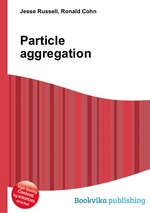Particle aggregation
Jesse Russell Ronald Cohn
бумажная книга
High Quality Content by WIKIPEDIA articles! Particle aggregation refers to formation of clusters in a colloidal suspension and represents the most frequent mechanism leading to destabilization of colloidal systems. During this process, which normally occurs within short periods of time (seconds to hours), particles dispersed in the liquid phase stick to each other, and spontaneously form irregular particle clusters, flocs, or aggregates. This phenomenon is also referred to as coagulation or flocculation and such a suspension is also called unstable. Particle aggregation can be induced by adding salts or an other chemical referred to as coagulant or flocculant. Some people refer to specifically to flocculation when aggregation is induced by addition of polymers or polyelectrolytes, while coagulation is a more widely used term.


